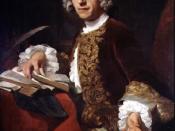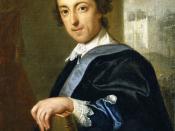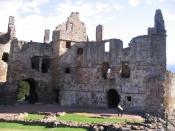Gothic literature was born in 1764 when Horace Walpole published The Castle of Otranto, which is considered to be the first gothic novel ever written. Gothic literature was originally written as a reaction to the age of reason, order, and the politics of eighteenth-century England. Containing anti-Catholic sentiments and mythical aspects, Gothic literature explored the tension between what we fear and what we desire. The stories were usually set in some kind of castle or old building that showed human decay and created an atmosphere of mystery and suspense. Often, one of the main characters would be some sort of damsel in distress, threatened by some man. The words chosen in these novels and short stories were very descriptive, creating overwrought emotion and often, feelings of gloom and horror. Also, within the plot, some sort of ancient prophecy, along with omens and visions, could usually be found. The most important elements to the structure of canonical gothic literature, however, are supernatural and unexplainable events.
In The Castle of Otranto, much of the plot surrounds one unexplainable incident: a giant black helmet falls on Prince Conrad, thus killing him. Because of Prince Conrad's death, Manfred, his father, captures a passing peasant, Theodore, and pursues Isabella, Conrad's fiancee. Later, it is learned that Jerome (the minister) is Theodore's father. If the helmet had never fallen on Conrad, Manfred never would have stopped Theodore, and Jerome would never have found his long lost son. Manfred, still believing that Theodore is guilty of dropping the helmet by sorcery, is ready to execute him.
At this point in the story, Isabella's long lost father appears, which halts Theodore's execution. It is later learned that Isabella's father found her because a dream he had led him to a monk, who led him to Otranto. The supernatural...



Clear explanation of Gothic conventions followed by exaples of related writings.
Creative, language used to provide a clear explanation of the Gothic genre, with appropriate examples of texts. Well structured, and easily understandable piece of writing could benefit from a detailed bibliography and use of footnotes, but overall a 9/10 essay.
13 out of 13 people found this comment useful.